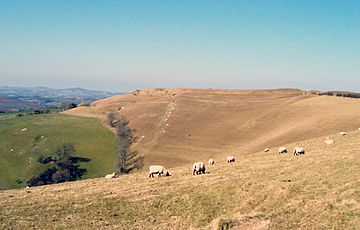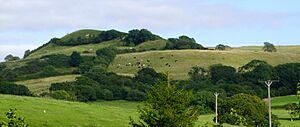Eggardon Hill facts for kids
Quick facts for kids Eggardon Hill |
|
|---|---|

Eggardon Hill from the southeast
|
|
| Highest point | |
| Elevation | 252 m (827 ft) |
| Prominence | 115 m (377 ft) |
| Listing | Hardy |
| Geography | |
| Location | Dorset, England |
| Parent range | Dorset Downs |
| OS grid | SY541947 |
| Topo map | OS Landranger 194 |
Eggardon Hill is a cool spot in Dorset, England. It's about four miles east of Bridport. This hill stands tall at 252 meters (or 827 feet) above sea level. From the top, you can see amazing views in almost every direction!
The southern part of Eggardon Hill is looked after by The National Trust. This means you can visit it for free all year round. The northern part of the hill is privately owned.
Contents
A Peek into the Past
Eggardon Hill has a long and interesting history. It was first written about in the Domesday Book way back in 1086. But its story goes back much further than that!
The Iron Age Hill Fort
Around 300 BC, people used Eggardon Hill as a hill fort. This was a special kind of settlement built during the Iron Age. It had strong defenses to protect the people living there.
Historians think the Romans might have taken over these forts. This happened during their invasion of Britain around 43 AD. However, we don't have direct proof for Eggardon Hill. Archaeologists have never dug up the site to find out more.
Ancient Burials
You can also find several tumuli on the hill. These are also called barrows. They are ancient burial mounds. Finding them here tells us that people used this hill a very long time ago.
Smugglers and Pine Trees
Later on, a famous smuggler named Isaac Gulliver (who lived from 1745 to 1822) owned a farm nearby. He is said to have planted a group of pine trees on Eggardon Hill. These trees were like a special landmark for his ships. They helped him find his way to the Dorset coast, especially at night.
The government eventually ordered the trees to be cut down. But you can still see the octagonal earthworks today. These were built to protect the trees from strong winds. You can even spot them on maps of the area!
What's in a Name?
The name "Eggardon" comes from an Old English word. It means "the hill belonging to Eohhere." So, it's named after someone who owned or was connected to the hill a long, long time ago.
 | Janet Taylor Pickett |
 | Synthia Saint James |
 | Howardena Pindell |
 | Faith Ringgold |


